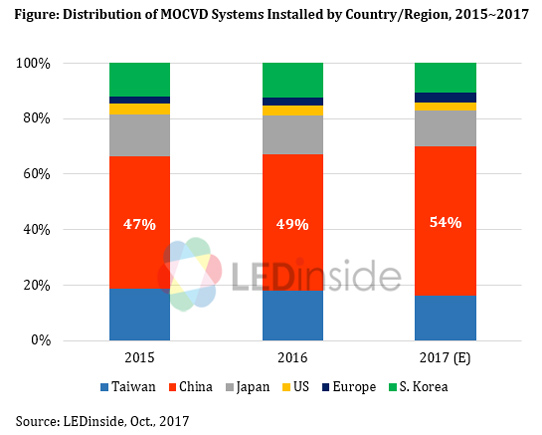- News
24 October 2017
Chinese LED chip suppliers to comprise 54% of global production capacity in 2017
Total global LED chip production capacity has entered a new peak expansionary phase in 2017, according to the latest LED market supply and demand analysis by LEDinside (a division of TrendForce). This recent surge of capacity expansion has been a response to the rising demand from Chinese LED package suppliers that began raising their production capacities earlier in 2016.
With Chinese LED chip suppliers recommencing their capacity building activities, LEDinside estimates that the number of metal-organic chemical vapor deposition (MOCVD) chambers (based on the standard K465i design) installed worldwide in 2017 will be 401, representing the largest chip capacity increase since 2011.
“At the start of 2017, major Chinese LED chip makers including San’an Optoelectronics, HC SemiTek and Aucksun revealed that during the year they will be carrying out major capacity expansion plans,” says LEDinside research director Roger Chu. “The new processing operations set up by the domestic chip makers will push China’s representation in the global MOCVD capacity to 54%,” he estimates.

This wave of capacity building for LED chips in China has been to meet the growing demand from the LED package suppliers downstream, Chu adds. Furthermore, domestic package suppliers in recent years have been relocating their operations to second-tier cities due to the rising costs of labor and land in the traditional industry clusters of Guangdong Province and the Pearl River Delta. Local governments in the smaller cities have offered various incentives to get LED companies to build factories in their domains. Consequently, China’s LED industry in 2017 saw another capacity growth spurt comparable to the one during the 2010-2011 period.
There have also been changes in China’s subsidy policy, LEDinside notes. In the past, small- or mid-size domestic LED companies were in a rush to build chip fabrication plants because local governments’ subsidies mainly targeted the upstream of the supply chain. In contrast, the latest round of subsidies targets the LED package industry and its related businesses. China this time wants to generate demand for the upstream by helping the downstream in opening up market channels. Hence, major domestic package suppliers this year have also been expanding their capacities together with the first-tier domestic chip makers.
The rapid and subsidized capacity expansions that is taking place in China is now heavily squeezing the profit margins of long-established LED companies on the global market, LEDinside believes. These international majors in turn have scaled down their own manufacturing or increased the proportion of outsourcing. Either way, Chinese LED companies will benefit and become even larger, concludes LEDinside.


